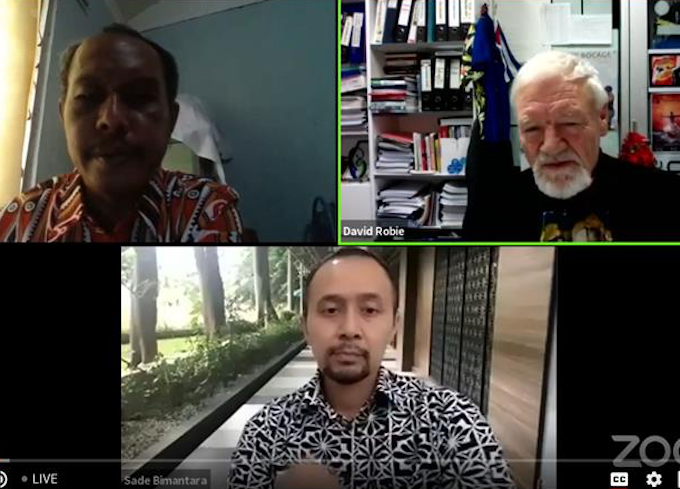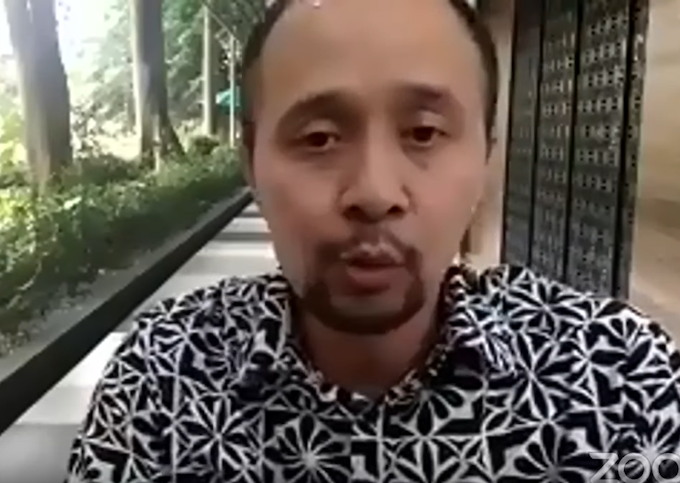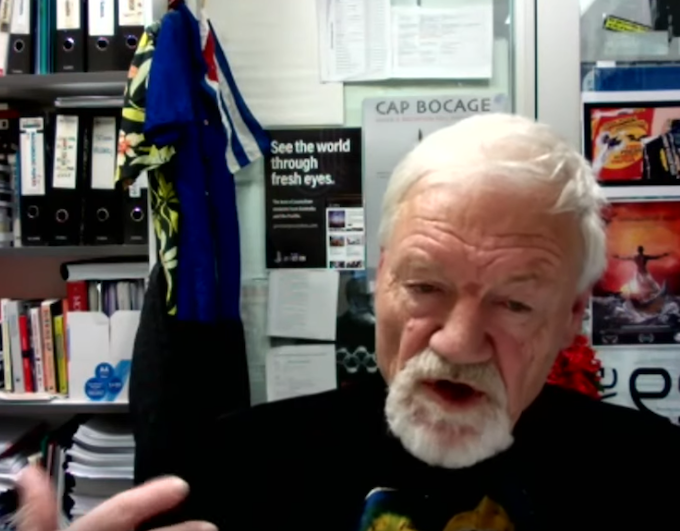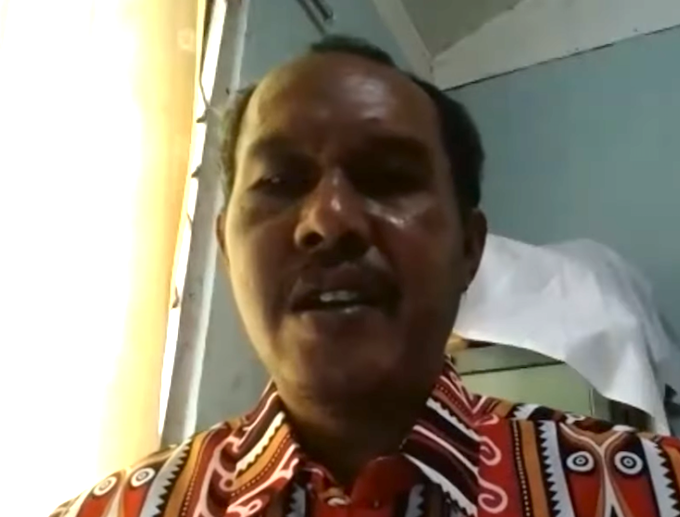The “Understanding information about the land of Papua ” webinar livestream. Video: Redaksi Jubi
A senior Indonesian government official and a New Zealand journalism professor have clashed over differing perspectives on access for journalists and media to the West Papua region.
Speaking on a webinar organised by the Tabloid Jubi newspaper in Jayapura, Ministry of Foreign Affairs’ director of the European affairs Sade Bimantara said Papua was “much more open” than credited in social media.
However, Pacific Media Centre director Professor David Robie said it was still extremely difficult for journalists in Australia, New Zealand and Pacific nations to visit the Melanesian region on assignment.
READ MORE: A Papuan open letter to Jakarta
He said it was “mixed” at best but in spite of the obstacles some excellent reporting was being done. This was the exception rather than the rule, as mainstream media in Australasia often ignored the West Papua issue.
Dr Robie cited two recent investigative documentaries, The Secret War for West Papua from ABC Foreign Correspondent in May and Al Jazeera’s Selling Out West Papua last month exposing the rapacious palm oil industry and deforestation, as quality “breakthrough” reports.
Bimantara said President Joko Widodo had personally led the “more open” policy with a directive in 2015 – the same year that two New Zealand video storytelling crews made rare visits to Papua.
The policy was putting emphasis on a “more humane approach where development and economic policies touch the lives of ordinary Papuans to bring justice, stability, prosperity at the centre of any policies – national or local,” the official said.
“You can see these policies in action.”

Criticism of development policies
Dr Robie cited the criticisms of development policies such as the Trans-Papuan Highway that had involved minimal or no consultation with Papuans, such as exposed by the recent book The Road by John Martinkus about “exploitation by foreign companies, environmental destruction and colonisation by Indonesian transmigrants”.
He also cited condemnation of the upgraded autonomy plan.
He said there needed to be more journalists visiting Papua freely “without minders” to report on the development issues and challenges, as well as social justice and human rights.
Bimantara said that while the “free and unhindered access” for media had been “slow to trickle down the bureaucratic ladder”, the policy had resulted in “robust and wide” data communication and access across Papua.
The ban on the internet – recently declared illegal by an Indonesian court – for a month last year at the time of the so-called Papuan Uprising with protests over racism was imposed to “put a break on the spreading of hate crime”.
Bimantara said the processing of journalists wishing to go to Papua had been speeded up and Jakarta-based media and foreign journalists were “free to go any time” providing they gave notification of where they were going.
He said that between 2016 and this year, out of 69 applications to visit Papua, 55 had been approved, “which means 80 percent were approved”.

Covid blamed for current restrictions
Any current restrictions were due to covid-19 coronavirus spread concerns.
Dr Robie said that due to the “extreme difficulties for journalists getting visas through the government ‘clearing house’ in Jakarta, the recent ABC production relied heavily on journalists on the ground in Papua, beginning their story with Papuan migrants and refugees in neighbouring Papua New Guinea.
“In the case of the ‘Selling Out’ programme, the producers relied on a ruse – the crew filmed the Wasur National Park in the massive wetlands near Merauke while actually making the wider palm oil investigation,” he said.
“As both a journalist and media academic, I have often referred to the West Papua information ‘black hole’ in various articles and videos since I wrote my first article about Papua in 1983.
“Other journalists have also referred to this black hole or black spot.”
Bimantara described racism against Papuans as an “isolated pattern”, but a prominent Papuan clergyman, Reverend Dr Socratez S. Yoman this week characterised “racism and injustice” as the root of the problems in Papua in an open letter to the Jakarta government.
The foreign affairs official said the Papuan Lives Matter movement had been gaining momentum in Indonesia since widespread anti-racism protests from Jakarta to Jayapura last year.
Sparked by racist harassment
The protests were sparked by racist harassment of West Papuan university students in Indonesia’s second-largest city, Surabaya.
Bimantara said that fake news and disinformation were prevalent in coverage of Indonesian-ruled West Papua.
He said there was a problem with disinformation about West Papua which was an “infodemic spreading like covid-19”, although he claimed this as coming from those leading the Papuan independence movement.
However, Dr Robie cited an investigation by the BBC and the Australian Strategic Policy Institute (ASPI) last year that found that a coordinated and well-funded network of “bots” – or automated accounts – that promoted a pro-government line was “skewing the narrative” about Papua.
When asked about this, Bimantara did not answer, while in other comments apparently blaming the disinformation on pro-independence sources.
“Just last week, our own news website Asia Pacific Report asiapacificreport.nz published a story about a Tongan Kiwi beauty queen, Diamond Langi, making a fairly low key solidarity statement in support of Papuan self-determination and expressing empathy for jailed political prisoners,” Dr Robie said.
“Langi was immediately denounced and abused by thousands of social media trolls from Indonesia and she was forced to close her Instagram account and render her Facebook account non active.”

Webinar drew lively interest
The webinar, moderated by leading Papuan journalist Victor Mambor, who visited New Zealand in 2014, drew lively interest with about 1000 viewers on YouTube in two days.
In response to some webinar social media chat comments, a Papuan NGO activist, who declined to be named, said: “Most of the questions raised are by intelligence agents who are using Papuan people’s accounts, photos or fake names.”
Former Green Party MP Catherine Delahunty said the panel was a worthwhile effort for greater understanding but she was disappointed by the “monotonous denials” of Bimantara over the difficulties for media reporting on West Papua.
“He made claims that are fine in theory but not in practice and also he made the revealing statement that the Indonesian state wants to know where journalists are going and what stories they plan to write.
“That is not the definition of a free press, that is censorship by an occupying government.”
Dr Robie cited the latest international reports from highly reputable media watchdogs on the issues in West Papua but the Indonesian responses were “very unsatisfactory”, she said.
“To accuse the United Liberation Movement of West Papua (ULMWP) and [a pro-independence leader] Benny Wenda as responsible for the killers of workers on the Trans Papuan Highway is just wrong.
“The armed struggle and the international solidarity effort are not the same groups, although all are dedicated to freedom for West Papua.

Honouring Te Tiriti
Delahunty, a spokesperson for West Papua Action Auckland, said that one point where she agreed with Bimantara was when he had talked about sovereignty movements in other countries such as Aotearoa New Zealand.
“Those of us who stand for a Free West Papua also need to stand up for a full honouring of Te Tiriti in this country.”
She commended Mambor and Jubi for hosting this dialogue, saying Professor Robie had a great understanding of the issues and the Pacific context but the claims made by Bimantara were the “usual justifications for the oppressive regime” in West Papua.
Joe Collins, leader of the Australian West Papua Association (AWPA), said from Sydney that although there has been improvement towards democracy in Indonesia it had not translated into democracy in West Papua.
“While people can be arrested and charged with treason simply for raising their national flag, it proves there is no justice under Indonesian rule,” he said.
“For all the talk about journalists being free to go to West Papua, journalists are regularly intimidated for covering demonstrations in West Papua and there is a track record of foreign journalists being arrested or deported for trying to do their job”.













































